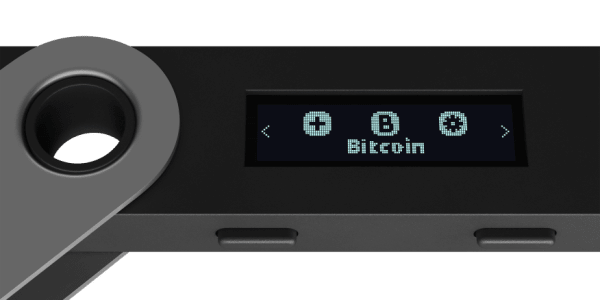
What is a Crypto Hardware Wallet / Cold Wallet?
Let's answer all your questions regarding hardware wallets and cold wallets in crypto. We'll cover the following:
- What is a hardware wallet / cold wallet?
- Cold wallet vs hot wallet?
- What is a non-custodial wallet?
- Should you use a hardware wallet?
If you already know about hardware wallets, we also have a table that shows how the best hardware / cold wallets compare.
What is a hardware wallet / cold wallet?
Private keys control your crypto. Like a password to an account, you need to keep these keys safe and secure. But they can be very long and hard to memorize. There's also no password reset if you forget your private keys. So a wallet can be used to store and manage them.
A cold wallet is something used to store private keys, where the private keys are not exposed to the internet. This adds a layer of protection against hackers that could steal private keys over the internet.
Hardware wallets are one subset of cold wallets. They are probably the most popular form of cold wallet, but not the only form of cold wallet. For instance, a paper wallet (where you just write your private keys on a sheet of paper) is a form of cold wallet.
Hardware wallets are very popular because of their durability and security. For instance, they aren't going to degrade as easy as something like paper. They can also be locked by a pin number. Therefore, even if someone has your hardware wallet, they can't access it without the pin.
Some examples of hardware wallets include Ledger, Trezor, and Blockstream Jade.
Hardware wallets are able to keep your private keys stored securely offline, but can then work with an online-connected device to send and receive crypto. These hardware wallets often have companion apps for desktop or mobile, where the hardware wallet can sign a transaction, then send the signed transaction to the online-connected device. Thereby keeping your private keys offline, while still allowing you to transact.
Cold wallet vs hot wallet?
In crypto, there are cold wallets and hot wallets. As mentioned, cold wallets store private keys, without exposing them to the internet. A hot wallet is a wallet that can connect to the internet.
This could be a wallet in the form of a mobile app or browser extension, such as MetaMask. Connecting to the internet can add convenience for things like sending and receiving crypto. But due to the online nature, it also adds a potential vulnerability to hackers.
What is a non-custodial wallet?
A hardware wallet is a non-custodial wallet. But what is a non-custodial crypto wallet? First let's define what a custodian is in the context of finance. According to Investopedia, "A custodian bank is a financial institution that holds customers' securities for safekeeping to prevent them from being stolen or lost."
So a non-custodial (or self-custody) crypto wallet, is a wallet where you hold your crypto, rather than a custodian holding it for you. And the way to hold your own crypto, is to manage your private keys yourself. So a hardware wallet is a non-custodial wallet, because you manage your own private keys, not a third-party custodian.
Should you use a hardware wallet?
"Not your keys, not your coins." Maybe the top reason to use a hardware wallet, is so that you can control your crypto, by controlling your private keys. If you have cryptocurrencies with a third-party, such as an exchange or a crypto interest account, then you are trusting them with your crypto. And you may lose all of it, if they mislead, misuse, or mishandle any of it.
Of course there are disadvantages to a self-custody wallet like a hardware wallet. You are the custodian. So if you lose your hardware wallet and private keys, there is no one to turn to. There is no reset password. With great power comes great responsibility.
With a hardware wallet, you are also of course missing out on the features offered by something like an exchange or interest account. Though certain hardware wallets often have companion apps (for example Ledger Live) that can provide some of these features. But there's no free lunch. Companion apps can open the door to vulnerabilities as well.
There are also hot wallets such as MetaMask, that allow you to maintain control over your private keys, but with more convenience when transacting and interacting with web3. Are you using your wallet to hodl, or to participate frequently in the crypto / web3 ecosystem? Depending on your needs, using a hot wallet might be worth the added risk of being connected to the internet.
So all in all, there's no silver bullet. Only trade-offs. How much do you value convenience? How much do you value security? How much do you trust the platform you're considering using? How much do you trust yourself?
Do your best to understand these tradeoffs when making a decision on how to store your cryptocurrencies. And no matter how you choose to store your crypto, nothing is completely without risk.
If you are on thinking of buying a hardware wallet, some options include Ledger, Trezor, and Blockstream Jade. Ledger is offering $10 in BTC with your purchase, and Blockstream will give you 10% off their Jade wallet. Here's how these hardware wallets compare.
Some content may contain affiliate links, meaning that for referring you, we may receive a commission. This is at no cost to you, and may provide you with a bonus / discount as part of the referral offer.
This content is for general informational purposes only and is not financial / investment advice.